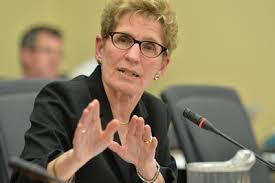March 10th, 2017
BURLINGTON,ON
What did you do to celebrate International Woman’s Day? I attended a media roundtable with Ontario’s first female Premier at her office in Queen’s Park. Always professional and direct, Kathleen Wynne should have been facing a potentially tough media presser, the trendy term for press conference. But she got off lightly considering the topic, electricity pricing, has been largely responsible for her party’s position at the bottom of the opinion polls.
The sorry history of the electricity file most recently begins with that common sense guy, Mike Harris, who did to Ontario’s electoral sector what GW Bush had done to Iraq. In his ideological zeal to replace everything government, he broke up Ontario Hydro then banned Ontario Power Generation (OPG), one of the largest and most experienced power companies in North America, from developing alternate energy supplies.
His mismanagement spiked hydro rates and led to black and brown outs, even in that brief period of these changes before the Liberals ousted him. But then Dalton McGuinty had also drunk the Kool Aid, and in his passion to keep the lights on while he phased-out the coal power plants, continued writing lucrative 20 year private sector energy contracts like the proverbial drunken sailor. The contracts mostly guaranteed prices and quantities of power delivered, regardless of whether the energy was needed.
It made some sense from the point of view of the small energy supplier who needed market assurances in order to invest. But in the process Ontario not only bought over-capacity, but over-production, which periodically has to be sold at bargain basement rates to utilities south of the border – or spilled.

Niagara Falls – the source of a lot of the energy that powers western Ontario. It once made the province a leader in hydro generation.
McGuinty and Harris and their cheering section of academics and industry special interests were wrong when they claimed electricity in Ontario shouldn’t be a natural monopoly. It is no secret that those public hydro monopolies in B.C., Manitoba and Quebec have the lowest utility rates in the country. Of course those provinces have vast stores of water power and Ontario did waste a ton of money experimenting with the nukes. But where has all this new alternative private power development landed us? When prompted, the Premier confessed that her staff had considered re-inventing the old Hydro One, but they believe the time for that option is long passed.
We are now stuck with our mixed private-publicly owned system and the consumers are stuck with the big bills we’ve seen of late. So instead of forcing energy users to pay those bills as we go, Ontario’s new ‘Hydro Plan’ involves buying a 30 year mortgage at today’s low interest rates. That way those billions of dollars committed to private sector contracts will spread out over a longer term, and even with the new financing costs, the average utility bill will fall by about a quarter. Of course that presumes that interest rates don’t start to rise.
The government will peg rate increases to inflation for the next few years, while doing something to bring down the outrageous cost of delivery and using more tax-based subsidy to assist households with lower incomes, and small business. Electricity is no stranger to subsidy and debt. We should recall the massive debt the old Ontario Hydro had run up prior to Harris’ version of shock and awe. Almost 30 billion in liabilities exceeded the assets of both Hydro One and OPG.
Wynne may call this a structural change, sharing the financial burden imposed by these contracts with the next generation. But it is really just about moving money around, taking out a mortgage to help cover sunk costs instead of paying as we go. And it’s not like there are any other options to lower the prices, short of tearing up the contracts, something the courts would never allow.
So the Premier got off pretty lightly with the media at the presser. Perhaps they all understand that she is short on options to deal with something that should have been dealt with a decade or two earlier. Or maybe they are just tired of this topic that has been played too frequently by a media looking for human interest stories, and opposition parties looking to raise their own profile.
We should all hope that the mistakes of the past will not be repeated and that somebody in the energy ministry is working on a real plan, but that was not revealed in the Premier’s presser. Perhaps that is something she is keeping under wraps until the party’s election platform is unveiled next year? But for now it looks like this is as good as it gets.
 Ray Rivers writes weekly on both federal and provincial politics, applying his more than 25 years as a federal bureaucrat to his thinking. Rivers was a candidate for provincial office in Burlington in 1995. He was the founder of the Burlington citizen committee on sustainability at a time when climate warming was a hotly debated subject. Tweet @rayzrivers
Ray Rivers writes weekly on both federal and provincial politics, applying his more than 25 years as a federal bureaucrat to his thinking. Rivers was a candidate for provincial office in Burlington in 1995. He was the founder of the Burlington citizen committee on sustainability at a time when climate warming was a hotly debated subject. Tweet @rayzrivers
Background Links:
Premier’s Statement – Wynne’s Popularity – Hydro plan – More Hydro Plan –
Voter Anger – Business Perspective –
























Having worked in the energy sector for a few miserable years (the worst experience of my life, by the way!!) let me offer a different interpretation.
The problem with the energy sector in Ontario is the very people who work in it. When they broke up Ontario Hydro and created all the little successor companies guess who staffed those new roles? When they looked for experts to design the regulated marketplace where did the people who designed the system come from? Guess who provided a good chunk of the advice and input on the Premier’s Green Energy Plan?
Asking former Ontario Hydro executives imbued with an entitlement mentality, and who worked in one of the most financially mismanaged enterprises in this country’s history, to run the energy sector is like hiring a thief to guard the Canadian Mint: you are really asking for trouble. The problem with the energy portfolio isn’t a Kathleen Wynne, Ernie Eves or Mike Harris problem. If the Premier really wants to fix the energy portfolio she needs to look at making massive systemic changes and that starts by cleaning out all the fossilized relics and dead wood at Hydro One, OPG, the IESO, the Ontario Energy Board, and all the rest.
To use an old Greek adage “The fish stinks from the head”.
So, this all lands on McGuinty and Harris shoulders?? I must have missed somethings in your article. Did Ms Wynne not play a role in any of this? Didn’t she recently privatize a portion of Hydro One……….Please, tell the full continuing saga of this Liberal gov’t. Isn’t the Cap and Trade tax now an invisible part of Wynne’s Electrical bill. Don’t leave out one of the main characters hoping that will help her get re-elected.
And now she spins why our children should pay their future share of OUR provincial fiscally mismanaged assets.
Full disclosure makes for accountability and transparency. We should expect it from everyone in public office, on the public purse or those reporting on said individuals
There are several tried and true energy storage solutions that do no involve batteries and solve the problem of intermittency of wind and solar grid power. Technologies from small scale grid level flywheels to compressed air systems, pumped hydro reservoirs and hydrogen storage. Governments and electricity generating entities need to get on with identification and implementation of these technologies and continue to think long term about greening the grid. Natural gas is a great interim solution, greener than coal and conventional nukes, but not the long term solution. As with tar sands oil, as reserves run low, we have to employ measures to extract which cause more harm than good and turn the efficiency equation on it’s head. Hydrogen, while innefficient in terms of conversion is very effective in terms of storage capacity – so much so that virtually all the excess generation from wind and solar could be captured minus only a 30% efficiency loss vs a 100% loss of excess generation with no storage capability. In a world with 50% on demand renewables capacity, capturing that extra energy could translate to 70% renewables which even by the most aggressive population forecasts would mean 40% less green house gas than todays energy regime. Well worth mortgaging and once paid for, energy prices could plummet dramatically. Of course, anyone alive today will not live to see this and that is just harsh reality. Kathleen Wynne did not create this issue, but ammortizing it further in the future to enable investment in a long term vision seems to me to be the right thing to do. Of course the skeptics will dismiss this as a pipe dream and who knows, maybe they are right, but if there is any hope for humanity it’s that we get out of greed mode and start looking way ahead.
How about Ontario investing in cheap clean reliable natural gas plants, and lots of them. Ontario is stupidly rich with cheap natural gas. Our hydro rates should be the lowest in North America, and we should be an exporter of hydro, not a buyer. Instead, we get our liberal governments cancelling natural gas plants and going the disastrous route Germany has gone, investing in completely unreliable and insanely expensive alternative energies, like solar and wind. Alternative energy will always super expensive and unreliable until scientists find a way to reliably store that energy for times when the sun isn’t shining, or the wind isn’t blowing. Which, by the way, is often.
High electrical costs are killing this province. Why would our major businesses stick around and lose so much money due to hydro? Especially when the price of hydro will be going, down, down, down down in the States while Ontario’s goes out of site. Just like our industries will soon be.
This should be a lesson to the United States, but probably won’t be since the current regime has taken power. The disemboweling and defunding of federal agencies, the sale of public functions and public lands to private corporations, the ramming through of a “Health Care Plan” which will divert huge amounts of money to private insurance companies, the planned privatization of Social Security and MediCare/MediCaid – the beneficiaries pouring kick-backs into the political campaigns of the Republicans who brought them this largesse, is straight from Mussolini’s Fascist manifesto.
I am surprised to see such movements in the Canadian system, one long admired as usually sane. But this ethic seems to be sweeping the Western world, from Europe to, now Canada. This is indeed troubling.